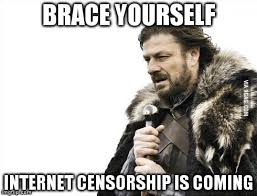CDT Lacks Standing to Challenge Trump’s Anti-230 Executive Order

Meanwhile, the EO was a pernicious and hateful document that tried to advance and justify government censorship. The world would have been better if it never had been issued. Thus, I was happy to see CDT challenge the EO’s constitutionality. Even if the challenge was doomed, it highlighted how the EO was a flaming pile of pro-censorship garbage.
Unfortunately, CDT’s challenge did indeed fail on standing grounds, at least for now. This echoes the result of another challenge to the Trump EO, Rock the Vote v. Trump, which also recently failed for lack of standing.
Concreteness. “there does not appear to be a ‘direct conflict’ between Order 13,925 and CDT’s stated mission.” The court explains:
The Order expresses “the policy of the United States to foster clear ground rules promoting free and open debate on the internet.” CDT asserts a similar mission—to “advocat[e] in favor of First Amendment protection for speech on the Internet.” One would think that CDT would applaud the President’s desire to prevent online censorship
Dafuq?
First, a central tenet of our tripartite division of government power is that the executive branch inevitably will exceed its legal authority and the judicial branch will discipline the overages. To do this, courts have to scrutinize executive branch actions, not rubberstamp them. The EO’s claim to promote “free and open debate on the internet” is an obvious and brazen lie that most judges would not take at face value. Unquestioningly repeating the claim shows unusually deferential acceptance of an executive branch claim–or maybe it’s a bit of judicial gaslighting?
Second, I don’t understand how any judge could say unironically that President Trump desires “to prevent online censorship.” Pres. Trump has spent 4 years in office loudly and repeatedly championing increased government censorship. It’s been impossible to miss. Maybe this judge mistakenly believes it’s “censorship” when private publishers exercise their editorial discretion?
Fortunately, the judge doesn’t dwell too long on this misguided characterization, so I won’t either. The court continues discussing CDT’s lack of concrete injury:
CDT’s alleged injury—resources spent monitoring federal agencies, participating in their proceedings, and working with lawmakers—is one to its advocacy work, which is not a cognizable injury….In other words, CDT has shown that it is engaging in business as usual.
Non-Imminent Injuries. Because the President can’t unilaterally amend statutes, the EO asked other entities to do its dirty work. Unless and until those other entities take a legally significant action, the EO remains more aspirational than consequential. The court says: “the government might issue regulations that CDT does not like. But it is just as possible that it will not.” (To be clear, any regulations spurred by the EO will be censorial garbage, but it remains possible that no regulations will issue at all).
Standing Based on Third-Party Services. “Online behemoths like Twitter and Facebook command armies of attorneys and lobbyists. They do not need CDT to carry their water for them.”
FFS. The Internet is driven by small UGC services who don’t “command armies of attorneys and lobbyists” yet will be crushed if Section 230 is amended as contemplated by the EO. CDT speaks for all of them, not just the “online behemoths.”
Redressability. “Order 13,925 represents an exercise of the President’s official duties, rather than a ministerial act,” and courts can’t enjoin the president those duties. The court similarly rejects CDT’s request for declaratory relief.
Ripeness. “Order 13,925 places no obligations on any private party. It merely directs government officials to take initial steps in government processes that might (but may not) eventually lead to law governing private parties.”
About the Judge. It makes me uncomfortable to talk about judges’ partisan allegiances. A federal judge vows to uphold the constitution and serve the American people, regardless of what partisan views they held pre-appointment. Indeed, we’ve seen many judges appointed by Trump rebuff his campaign’s efforts to overturn the election. Still, I know some of you are wondering about this judge (Judge Trevor McFadden), and some facts will support your skepticism. Yes, he was appointed by Trump. Yes, he’s a long-time member of the Federalist Society. Yes, he made a campaign donation to the Trump campaign.
Case citation: Center for Democracy & Technology v. Trump, 507 F.Supp.3d 213 (D.D.C. Dec. 11, 2020)
Pingback: News of the Week; December 23, 2020 – Communications Law at Allard Hall()